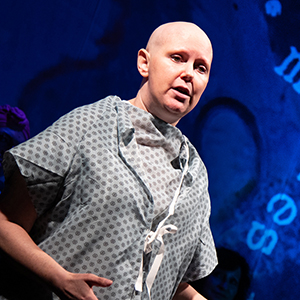-
Survivor Profile
Grinding Through ItConnor Joe’s grit and determination helped him return to major league baseball after surgery and chemotherapy for testicular cancer that had spread to his lung.
by Marci A. Landsmann
-
Coping With Chemo Brain
Many cancer patients have problems with memory or thinking that can linger for years after treatment. The cause is a mystery, but new tactics are helping many people cope with its effects.
by Stephen Ornes
-
Forward Look
Coordination of CarePilot program emphasizes standards to streamline patient care.
by Carolyn Bernhardt
-
Need a Ride?
Cancer center expands pilot program to provide transportation for patients to get to appointments.
by Karen Blum
-
Cancer, On and Off Stage
Erin Cronican, who has stage IV breast cancer, plays the lead role of a professor diagnosed with metastatic ovarian cancer in the New York City production of Wit.
by Pamela Rafalow Grossman
-
Acknowledging the Stress of Cancer
A patient advocate session at the San Antonio Breast Cancer Symposium offered practical tips for dealing with cancer.
by Marci A. Landsmann
-
Balancing Early-Stage Prostate Cancer Decisions
Choices about screening and treatment for early-stage prostate cancer are complex and largely personal.
by Kendall K. Morgan
-
Survivor Profile
Strength in the PackWhile undergoing treatment for colon cancer, Trevor Maxwell started Man Up to Cancer, a support community for men.
by Jon Kelvey
-
Forward Look
A Closer Look at Survivorship Among HispanicsStudy investigates factors that contribute to cancer outcomes in a large and growing segment of the U.S. population.
by Sharon Tregaskis
-
Telling Your Children About Your Advanced Cancer Diagnosis
Providing age-appropriate information can help children process your diagnosis and ask questions.
by Lorna Collier
Cancer Talk
At-home Prostate Cancer Test May Help Some Men Avoid Biopsy
The test, which analyzes urine for 18 cancer-specific genes, ruled out the need for biopsy in men with elevated PSA without a digital rectal exam.
by Sandra Gordon
The Power of ComedyIn a new play, the pain of cancer can be a chance to laugh.
by Ashley P. Taylor
Melanoma Risk in Childhood Cancer SurvivorsPeople treated for childhood cancer found to have twice the risk of developing melanoma as an adult.
by Cameron Walker
Online Second OpinionsMore than half of patients who participated in a program offering online second opinions were recommended a change to their treatment plan.
by Eric Fitzsimmons















